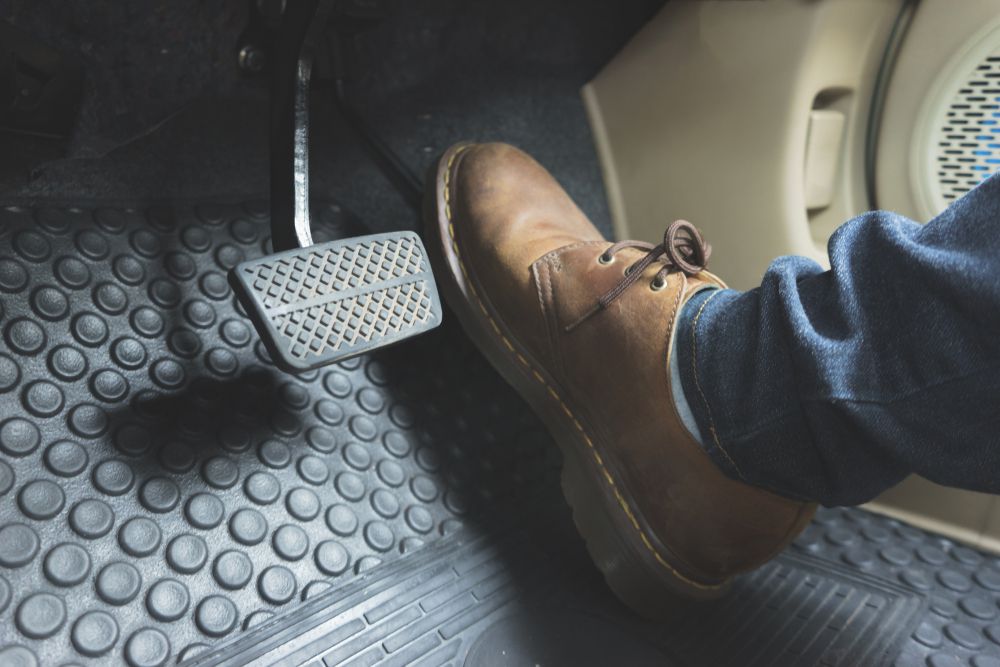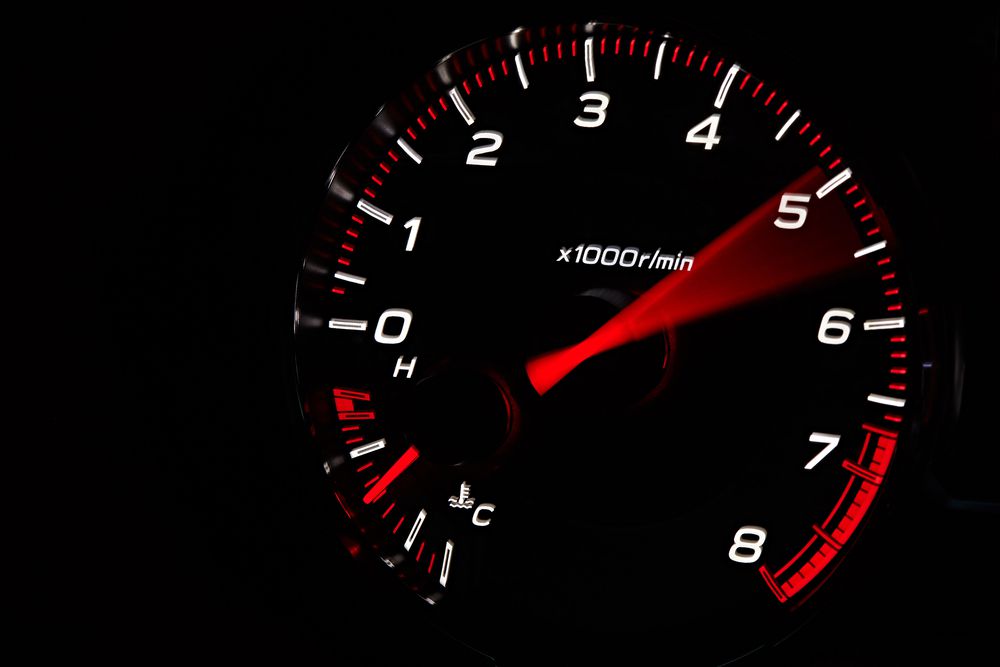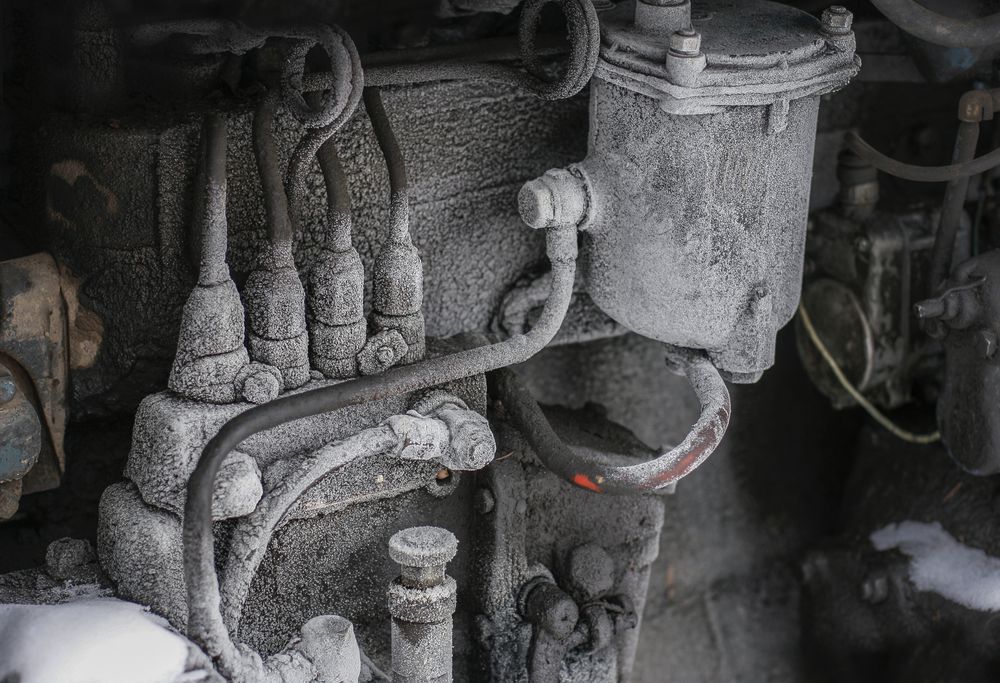As a car owner, you may want to know whether flooring your vehicle, also known as putting the pedal to the metal, is bad?
Occasionally flooring your car is not bad; it can be beneficial if done sparingly to burn carbon off the engine's valve seats. However, it can take a toll on the engine and other parts over time if done excessively. Furthermore, hard accelerating can wear the vehicle's transmission, rear end, and tires prematurely.
Below, we'll explore how redlining, hard accelerating, flooring, and revving your engine while in park affect a vehicle. You'll also learn about when it's okay to floor a car.
 Foot pressing down on an accelerator pedal
Foot pressing down on an accelerator pedal
Does Flooring Your Car Hurt The Engine?
First, let's clear up the question: What does flooring a car mean? Flooring is when you push the gas pedal as far as it goes at once to accelerate.
Generally speaking, flooring a car will not hurt its engine. This is because auto manufacturers engineer their engines and the various vehicle components in the drive train to withstand a fair amount of stress.
It is often necessary to floor your car, for instance, when passing slower-moving vehicles on the highway.
That said, will flooring your car mess it up in certain instances?
Consider the following factors that may cause flooring to hurt the car's engine:
Flooring when the engine is already overheated/overheating
Flooring when the engine has just been turned on and is still cold
Flooring with a relatively old car or car with a lot of mileage on the engine
Is Redlining Bad For Your Car?
Redling is when the rpm (revolutions per minute) reaches the redline on the vehicle's dashboard's tachometer. The “red line” marks the maximum rpm the engine can safely reach without causing damage.
Redlining is not inherently bad for your car since, after all, the engines are engineered to reach that acceleration in the first place.
However, when you abuse the redlining, your car's engine and other components can begin to suffer.
Any time you push your vehicle to its maximum, it will take a small toll on it, so frequently, redlining is not a good idea.
 Tachometer approaching redline
Tachometer approaching redline
Is Hard Acceleration Bad For Your Car?
Occasional hard acceleration probably will not harm your vehicle significantly because, like red-lining, your car is engineered to withstand a fair amount of hard acceleration to do things such as passing on the highway.
With that said, over time, hard accelerating will prematurely wear your vehicle's components, like the tires and transmission, if done routinely.
Also, the more you hard-accelerate, the more you have to brake hard to slow back down, whether it's to go around a turn or come to a stop sign. This leads to premature wear on your brake pads and rotors..
Is It Bad To Floor A Cold Engine?
It is not recommended to floor (red line) a cold engine. This is because a cold engine's oil will still be viscous and doesn't pump as easily as once it's warmed up and “thinned out.”
You risk premature wear if you floor a car with an under-lubricated engine.
You could end up doing the following:
Damaging the piston seals
Adding extra wear and tear to the valves, bearings, and other engine components
 Cold engine
Cold engine
Is Revving Your Engine In Park Bad?
Like redlining your car or hard accelerating, revving your engine in park isn't going to be detrimental if the motor is warmed up.
Only when you do this in excess can it take a toll on the engine. Another possible downside of revving your engine when the gear is shifted to "park" is that you will inevitably do the following:
Can Accelerating Too Fast Damage Transmission?
Occasionally accelerating too fast shouldn't damage a transmission, particularly if the transmission is new or well maintained.
Once a transmission ages, or if the transmission is poorly maintained, the probability of transmission damage is increased.
The internal components in older transmissions will have worn, internal valves don't function like they used to, the transmission oil may be contaminated, or the fluid level may be low. When an older transmission with any of the above characteristics is stressed, you could get catastrophic failure.
Is Flooring It The Fastest Way To Accelerate?
Flooring your vehicle is usually not the fastest way to accelerate. Flooring a vehicle, particularly if you have a powerful rear-wheel-drive vehicle, will cause your tires to spin, significantly reducing your effective speed.
In older vehicles, flooring your vehicle may flood your engine, causing the vehicle to hesitate because the throttle opens too fast.
The best strategy to accelerate fast is to apply as much throttle, and be in the appropriate gear, as you can without spinning the tires.
Conclusion
Flooring your car isn't bad as long as you don't do it often or when the engine is still cold. Be sure to only redline, hard accelerate, or floor your car in moderation and when the engine is in good shape.